- Home
- Edmund White
Inside a Pearl Page 8
Inside a Pearl Read online
Page 8
A typical day at Cannes was at once somnolent and exhausting. Since This was the manager of five cinemas in Zurich and since his rivals, who managed national chains, got all the blockbusters, he had to run after all those “interesting” movies made by Belgians or Taiwanese, films that would presumably receive good reviews. We would see as many as five films during the day in what was called the marketplace. He provided me with full accreditation as his assistant. My parents had not permitted me as a child to see many films, no more than one a year, considering them an unhealthy influence. As a result now I was overly sensitive to anything occurring on screen and would scream bizarrely if a close-up showed an actress breaking a nail. Anything sad made me cry and when it was all over I said to This that I felt like a Japanese court lady out of Sei Shōnagon; I’d spent five days in dark rooms weeping.
I suppose the two biggest evenings I had at the Croisette were both in 1985: Rendez-vous, with Juliette Binoche in her first leading role—everyone knew right away that a star was being born—and Paul Schrader’s Mishima. Schrader and his wife, the actress Mary Beth Hurt, were friends of This and had been traumatized because they’d just been held up by thieves while they were looking at the view from a turnoff near the French-Italian border. The sets and costumes in Mishima were sumptuous, the whole film was beautifully conceived, and it won the Palme d’Or.
We would dash from seeing two or three films in the morning (This would often fall asleep in his seat) to the beach, which was partitioned into expensive cabanas with lounge chairs. We’d take the sun and have our lunch while tall, elegant Africans threaded their way among the bronzing white people offering for sale African carvings and jewelry no one bought. After lunch, we’d go see more films—at the old competition palace, where there was a director’s festival, or back to the marketplace scattered among the city’s various commercial cinema theaters. In the evening we’d don our tuxes and head for the red-carpet events or we’d grab a drink in the lobby and bar of the Carlton, which was thronged with propped-up cardboard promotional cutouts. Dozens of paparazzi clustered around the entrance on the lookout for stars. We had drinks with Spike Lee, who was just beginning to be known. I wasn’t really used to being the quiet little sidekick. It’s a very tiring role, and of course no one knew who I was. It gave me a new appreciation of what John Purcell must have felt all the time, although John seemed suited to his role as sidekick/son/wife/kid brother. And yet I wondered how happy anyone could be playing second fiddle. No matter how wifely his fantasies, every man is brought up to be the first violin.
No one lingered long because everyone was looking for producers and distributors. It struck me that although a movie required hundreds of thousands if not millions of dollars to make, most of the actual filmmakers were poor and perennially broke. In this crowd at the Carlton bar, everyone was trying to put together a deal. In Europe a film typically received a third of its money from distributors in the form of an advance against eventual receipts, a third from a TV channel, and a third from government subsidies or private producers. This last source of funding was the hardest to find, and all these half-shaved, half-bathed directors were scrambling around in search of money, their beseeching faces and politeness at odds with their bohemian backgrounds.
Late at night there were big parties in the area in the hills known as La Californie, in elegant rented villas. The Weinstein brothers and other moguls would be holding court. Metal torches were planted in the ground. Hundreds of Yugoslav or Greek or Taiwanese directors came out from under a log for funding or a free meal of hot hors d’oeuvres. Before Cannes, I’d assumed movie people were well heeled and that their money came to them in regular, foreseeable ways. I would never have guessed how improvised their financing was. Cannes (unlike the Venice Film Festival) was more devoted to wheeling and dealing than to pure cinema.
If Cannes could be symbolized by a white fur draped over a bikini, Berlin was cold and grimly serious, typified by dirty-haired intellectuals viewing a six-hour Bulgarian film about a failed businessman. Because This spoke German somewhat more easily than French or Italian or Spanish (though he was fluent in these languages as well), he felt more at home in Berlin—even though he’d been attending Cannes since the Sixties. In Berlin he had a secret language, Swiss German, which real Germans couldn’t understand. He would discuss money or business with other Swiss friends in Switzerdeutsch and no one knew what they were saying. He did so only in an emergency. Normally he spoke his guests’ language. I’d leave a table of Zurichois to go to the toilet and when I came back they would still be speaking in English. The French would never have been that polite. First, they wouldn’t all have been fluent in English, and second, they wouldn’t all have continued in a foreign tongue longer than a minute if they outnumbered the anglophones. Perhaps that’s the difference between a big country and a small one—moreover one like Switzerland with four national languages. When This and I went to Egypt it was with a Swiss tour in which the guides repeated everything in both German and French. No one got impatient. We even traveled with a mother and her grown son from Basel; she spoke to him in German and he replied in French. I once had to wait for someone in the lobby of a grand hotel in Switzerland. The young woman concierge chatted amiably with clients in French, Italian, German, Swiss German, and English without any apparent transition or hesitation. Movies in Switzerland often had subtitles in two or even three languages, which ate up the bottom third of the screen. As a child, This had been sent every summer to French-language camp in the western part of Switzerland. The Swiss French only rarely spoke German, and only those Swiss Italians who actually lived in the north knew German, while most of the Swiss Germans knew at least English and French.
One year in Berlin, the self-created it-girl Pia Zadora astonished the German journalists when she gave them a bikini session in the swimming pool in the old Kempinski Hotel Bristol on the Kurfürstendamm in Berlin. She also summoned them to her glamorous airport arrival when she walked down the stairs in a chinchilla coat—Germans weren’t used to stars of that magnitude. They were used to Tilda Swinton or Klaus Kinski talking about their roles as an English hermaphrodite or a suicidal Austrian homosexual. But Pia’s diminutive, sunny disposition, delicious child’s body and rich girl accoutrements were out of their range. Her very rich husband was an Israeli industrialist. He paid for billboards advertising her questionable talents as a disco singer and movie star along Sunset Boulevard back in Hollywood. She was made for John Waters.
The Berlin festival was in January, the coldest time of the year. It took me back to my adolescence in Chicago, my fear of freezing before I got home. I spent a lot of time alone and went to the Mövenpick cafeteria for my meals since the only German food word I knew was Kalbsleber (“calf’s liver”) and I quickly got tired of that. In spite of my nonexistent language skills, we went several times to the theater, where we saw plays I already knew and could follow (like Chekhov’s Three Sisters in 1984). Occasionally I’d be stuck in a new four-hour German play in which the characters were crawling across a huge, bleak rock surface.
Three Sisters, starring Edith Clever and directed by Peter Stein, was a breakthrough in what I joked was a daring experiment called “realism.” There were real birds on stage, confined by a nearly invisible wire net. The actors all left the stage to eat dinner in another room, not visible but audible to the audience. We could hear the clinking of silverware and plates and the shrieks of women’s laughter and the murmur of conversation. This went on for a very long time.
Once in Munich we went to see the reclusive director Werner Schroeter, who was editing his 1986 film, Der Rosenkönig, starring Magdalena Montezuma. We also spent time with the handsome, if drug- and AIDS-ravaged, film actor Dieter Schidor. Schidor usually played German soldiers in films like Sam Peckinpah’s Cross of Iron. He also produced and played in Rainer Werner Fassbinder’s last film, Querelle, based on Genet’s novel, in which Brad Davis, Franco Nero, and Jeanne Moreau also acted. Apparently he’d had se
x with the American writer Gary Indiana in an oven at Dachau while they were both tripping. Gary wrote about it in his 1993 novel Gone Tomorrow. When Dieter found out he had AIDS, he sold an expensive painting and traveled extensively. At last he was ready to commit suicide and took tranquilizers and sat in a tub full of hot water. The idea was that he’d doze off, sink under the surface and drown. A woman friend discovered him still alive days later and “saved” him, so that he could die a horrible death in a hospital ward weeks later, his body still recovering from the hot water burns he’d sustained over three days in the tub.
There was something perverse and eccentric about all the people who’d once surrounded Fassbinder. Although he was gay, Fassbinder had a wife, Ingrid Caven, to whom he was married from 1970 to 1972. She told us that once when she was in the States, she was broke and got a gig through the actor Peter Chatel to dub Deep Throat into German.
“I knew Rainer disliked porno and would never see it, and since I needed the money, I went ahead.”
Then one day, stopping in front of a cinema in Munich, Fassbinder had said, “This is that movie everyone’s talking about. Let’s go in and see it.”
“Oh, no, darling, it will be boring,” Caven said modestly.
Fassbinder insisted, and according to her the minute Caven’s first groan was heard he turned in his seat and slapped her and said, “Slut!”
We saw Caven in a strange ragtag evening onstage put together by Rosa von Praunheim. Later, in 1989, I saw her in Paris singing Édith Piaf’s repertory at the Plaza l’Athenée Theater. She was wearing a backless floor-length dress that Yves Saint Laurent had designed for her.
I once spent an evening in a garden in Paris with her and Maria Schneider, who was no longer the curvaceous teenager of the 1972 Bertolucci film, Last Tango in Paris, in which her character was sodomized by the much older Marlon Brando character using butter as a lubricant. I’d seen the film in Italy, and when the now-infamous scene began everyone in the audience was exclaiming “Burro, burro!”
Schneider felt traumatized by the movie and her fame and had turned to drugs, which had left her once-beautiful face ravaged. That night she was with her female lover, Pia, whom she credited with saving her. Caven was with Jean-Jacques Schuhl, a French writer who in 2000 won the Prix Goncourt for his novel Ingrid Caven—not a biography but a highly fragmented novel. Both Ingrid Caven and Maria Schneider had been in scores of films and survived decades of being sex goddesses.
Caven was often with Rosa von Praunheim, who, in spite of his name, was a man and a very sexy one at that in black leather pants. He’d defiantly assumed the name “Rosa” to recall the pink triangles that homosexuals had been forced to wear in the Nazi death camps. He, too, had made scores of underground films, most notably his 1973 hit It Is Not the Homosexual Who Is Perverse but the Society in Which He Lives. In 1992 Praunheim made a documentary about Charlotte von Mahlsdorf, an elderly drag queen who’d survived the Nazi and the Communist regimes, although it later came out that she’d collaborated with the Communists. Mahlsdorf lived in the Gründerzeit Museum in East Berlin, which she’d built to house artifacts of everyday life from around 1900 that she’d found at the dump and flea markets. The owners of the gay bookstore Prinz Eisenherz in West Berlin drove me there so I could meet her. She greeted us in a maid’s uniform at the entrance. The “museum” was filled with the conventional middle-class trappings of the period. There was a huge Swiss music box that played yard-wide metal disks. On the landing leading to the basement kitchen and a detailed recreation of an old Berlin gay bar, there was a vitrine filled with Charlotte’s sadistic leather accoutrements. Years later, in 2003, after she was dead, I saw the Pulitzer Prize–winning play about her, I Am My Own Wife, starring Jefferson Mays and written by a Texan, Doug Wright. From the play I learned that after the Berlin Wall came down and the Stasi files were opened, it was revealed that Charlotte had denounced people she knew in the antiques world. I thought anyone who survived the Nazis and the Communists as a transvestite must have made some serious compromises.
My This, with his beautiful clothes and kindness, gemütlich manners and eternal smile, was a striking contrast to these weird Germans with their perversions, drugs, and conversational directness. Once I asked Thomas, who’d grown up in Switzerland on the German frontier, if he’d ever run across the border to play with German kids, and Thomas shook his head and said, “No, my parents thought they were too dirty.” This often made fun of himself (while, it occurred to me, half bragging) by referring to himself as a simple peasant boy from the mountains, and I gather that in Swiss German he had a comically rustic accent. But in a way he seemed as pure as a mountain stream.
The Germans always seemed to rub the French the wrong way, all the stranger since the French liked to act awestruck by the monuments of German philosophy, art, music, and literature.
A beautiful young woman who was a Berlin journalist and looked like a boy came to dinner in Paris. Ina worked for a left-wing Berlin journal. At the time, I was still researching my Genet biography, and my other friends were all French Genet scholars. Ina also wrote about Proust, Musil, and Jelinek. At a certain point in the evening, Ina said, “Now let me understand. All the men here are gay and all the women are straight, is that right?”
You could almost hear the deflating horns descending, wah wah wah. Her question put everyone out of sorts, since French life is built on the possibility of seduction, on the unsaid (le non-dit). By spelling everything out, she’d threatened to end the game of flirtation. Of course an American—at least one with enough self-confidence—might have blurted out the same question, too, since we don’t like the murk of sexual ambiguity either. I suppose the Americans and the Germans are more alike than the French and the Germans.
Sometime in the mid-eighties, I made a trip to Berlin for Vogue with the photographer Dominique Nabokov. She was the widow of the composer Nicolas Nabokov, the great writer’s cousin. For years Nicolas had organized the Festival of Europe, which had turned out to be a CIA scheme for promoting a non-Communist left wing in Western Europe. Because of her husband’s old connections, Dominique knew “everyone” in Berlin. We interviewed Aribert Reimann, who’d written the opera Lear for Dietrich Fischer-Dieskau. I also spoke to Otto Schily, a founder of the Green Party and a member of the Bundestag. Schily predicted the imminent reunification of East and West Germany, which no one else was talking about. He said that the sense of everyone being German, East and West, was stronger than the Communist/capitalist divide. I was further shocked when he assured me reunification would come soon. All the more so when one of This’s friends, Karsten Witte, a film critic, arranged for me to go to East Berlin with two doctor friends of his, husband and wife, who drove me around the city. I was sitting in the backseat and within a few minutes the doctors pointed out that someone official was tailing us. The authorities stopped us and asked me why I was taking notes. I said it was for Vogue, just some banalities about the city, and they let us go.
This and I went to a beautiful, newly refurbished neoclassical theater in the East that had been run by Bertolt Brecht when he was alive. We saw The Threepenny Opera performed there by the Berliner Ensemble in a very scanty, impoverished production that brought out the plight of the poor, spunky characters. Near the theater was one of the few gay bars the regime permitted to stay open. The people there were shabby, friendly, and alcoholic, and many of the clients were women. No wonder people said the East was more genuine and “real” than the West, though few elected to live there, except the Mauerspringer (“wall jumper”), who’d confounded everyone by jumping the wall from the West to the East, then written a book about it.
Years later, after the Wall came down (on November 9, 1989), This and I ate at a trendy restaurant facing the splendors of the French Cathedral, the neoclassical Huguenot church on Berlin’s most beautiful square, the Gendarmenmarkt. I went to the nearby flea market where hordes of Eastern Europeans were selling off their most treasured belongings for relati
ve pennies, and the whole thing was terribly sad. Wanting to help one Russian man, I bought an icon from him. It was smoke-blackened from centuries of votive candles. The history of Europe and, it seemed, of my time in Europe was turning another terrible, irreversible corner.
We were always there in the winter, which was so much more severe than in Paris, where it rarely snows. But for me, Berlin was epitomized by old women in galoshes crowding into one of the many concert halls. The novelist Jeffrey Eugenides, who lived there for many years, told me that his Asian wife was repeatedly kicked by these old ladies in the bus. Since she was beautiful and young and Asian, they assumed she was a prostitute.
When I’d spoken to students in English in an old-fashioned wooden amphitheater, they’d all drummed their feet on the hollow-sounding floors instead of applauding. When I read to them from my complex, not entirely successful novel Caracole, a pimply male student attacked me for writing in a cultured “Thomas Mann style,” as if that were a terrible sin, and for recording painful events that had happened to me when I was much younger rather than reporting my current angst.
I knew from Nabokov’s novel The Gift that Berlin could be a summer paradise of interlocking lakes and nude swimming, but maybe Berlin was no longer entirely like that. I’d seen nudism in Munich’s English Garden, where there is also a perpetual cataract of cold water along the Eisbach, in which boys surfed in their wetsuits atop an up-gush—sometimes frozen in the hang-ten for minutes, their bodies tense and bulging beneath their Neoprene skins.

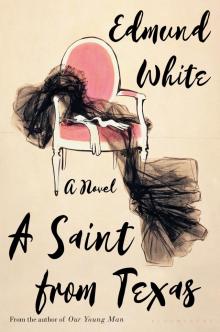 A Saint from Texas
A Saint from Texas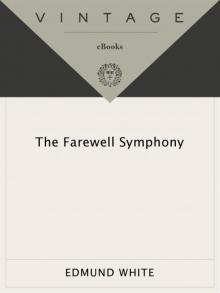 The Farewell Symphony
The Farewell Symphony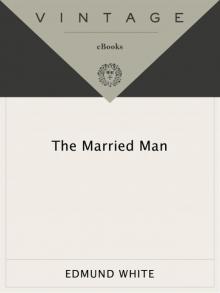 The Married Man
The Married Man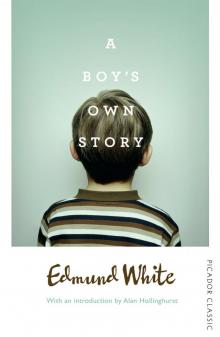 A Boy's Own Story
A Boy's Own Story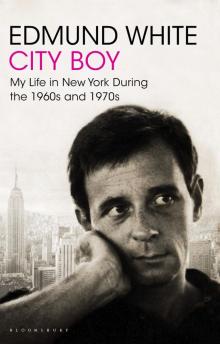 City Boy
City Boy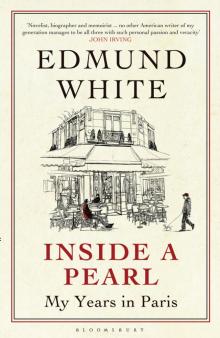 Inside a Pearl
Inside a Pearl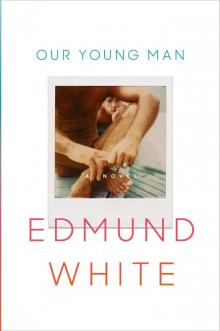 Our Young Man
Our Young Man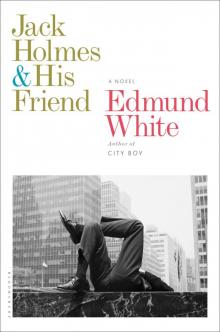 Jack Holmes and His Friend
Jack Holmes and His Friend